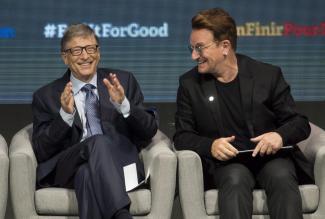Aid
Indispensable public sector

ONE publishes an annual assessments of global aid. The series is called Data Report. The guiding idea is to hold donor governments accountable. This year’s report shows that only six members of the Organisation for Economic Co-operation and Development (OECD), an association of donor governments, fulfilled the 0.7 % promise last year. Since the combined aid level for all OECD nations is a mere 0.31 %, ONE insists that ODA must more than double.
ONE appreciates that global ODA increased by 7.4 % last year, but emphasises that the sums donor governments spent on supporting refugees in their own countries rose in particular to $ 15.4 billion (almost 11 % of global total ODA). Three of the six OECD members that reached the 0.7 % goal only did so because of refugee expenditure. Germany was one of them, and ONE praises its Federal Government for the promise to stay in the 0.7 % range even as domestic refugee costs are set to decline in the future.
As ONE argues, money spent on refugees in OECD countries is spent well, but should not count as ODA. The reason is that it hardly contributes to improving the lives of people in the world’s poorest places. To alleviate poverty and contribute to achieving the Sustainable Development Goals (SDGs), ONE wants ODA flows to go to the LDCs. Their share of global ODA, however, has declined from about one third in 2013 to 28 % in 2016, whilst stagnating in real terms. According to ONE, “the quality of ODA is under threat”.
Apart from ODA, the report also considers developing countries’ tax revenues and the foreign direct investments (FDI) they attract. This approach is in line with the decisions made at the global Financing for Development Conference in Addis Ababa in 2015.
ONE sees “a crisis in domestic resource mobilisation in Africa”. African governments’ total domestic revenues are reckoned to have dropped by almost 24 % since 2012. The reasons, according to ONE, include low commodity prices, large informal sectors and complex tax as well as illicit financial flows, weak administrative capacities and corruption. The ONE authors demand that African governments shore up their act and spend larger shares of their budgets on the important sectors of health, education and agriculture. At the same time, sovereign debt levels are said to be rising once more.
The report notes that FDI is largely bypassing Africa. In 2016, the continent only attracted less than three percent of global FDI. Compounding the matter, a mere six countries accounted for 75 % of the FDI inflow to Africa’s LDCs and fragile states. In ONE’s view, ODA can be used to improve the business climate in order to attract investors. The report warns, however, that private finance cannot take the place of public investment. ODA is said to remain “vital as a concessional resource for the most vulnerable countries, which struggle to raise sufficient domestic resources”.
ONE calls itself a “campaign and lobbying organisation”. The term is correct, but it does not reveal that ONE is largely driven by mega-rich philanthropists. The board members includes billionaires as well as people who are either related to or work for the American billionaires Warren Buffett, Bill Gates, Mark Zuckerberg, Michael Bloomberg and George Soros. The board also includes Mo Ibrahim and Aliko Dangote, two very successful African entrepreneurs.
The individual most popularly known for his ONE involvement is probably the Irish rock star Bono. In spite of his counter-culture image, ONE actually represents a world view that is shared by some of the world’s richest persons. It is important to note that they consider public-sector spending indispensable for making markets work properly.
Link
ONE Campaign: The 2017 Data Report – Financing for the African century (includes several donor-country profiles).
https://www.one.org/us/data-report-2017/







